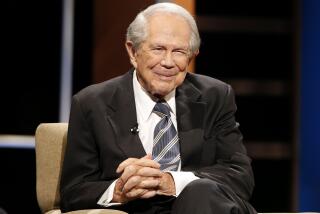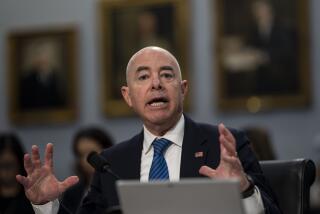TV Evangelists Stepping Up Appeals for Funds
Three years after the Jim Bakker-PTL scandal broke, some major television evangelists are devoting even more time to fund-raising and promotion and have turned to Eastern Europe as a focus of such efforts.
These are among the findings reported by Stephen Winzenburg, a scholar who has monitored religious broadcasting for a decade.
Winzenburg, a journalism professor at Grand View College in Iowa, studied the contents of 65 religious broadcasts from November, 1989, to February, 1990, and compared the content during that period to March, 1987, when the PTL scandal broke.
He found that Oral Roberts now uses 53% of his air time in fund-raising and promotion, up from 22% in 1987, and Pat Robertson spends 44% of his program time to do the same, up from 20%.
However, the trend was different for two other major television ministers. Jerry Falwell’s fund-raising and promotion declined from 52% to 37% and PTL, now known as Heritage Ministries, cut back its fund-raising and promotion from 40% of its program time to 12%.
“The programs that appeared to be in the most trouble three years ago have stabilized and have attracted a small but loyal number of contributors,” Winzenburg said. “But Roberts and Robertson must be in serious trouble to feel the need to spend almost half of their shows asking for money.”
The researcher also found that ministers such as Billy Graham, Robert Schuller and Jimmy Swaggart--in addition to Robertson and Falwell--”have each asked for more financial support so they can begin to evangelize in the European countries where democratic reforms are taking place.”
He also said that many major ministries have quietly returned to their pre-PTL-scandal levels of income. Most used the scandal “to raise funds by claiming they were struggling to survive,” he said. “Viewers responded with more money, and some TV ministers are now receiving more contributions than ever before.”
Reporting that seven of the top 10 religious broadcasts have seen their ratings increase in the last six months, Winzenburg commented that “the PTL scandal appears to have caused only a temporary setback to televised religion. Most televangelists have learned how to thrive off a smaller number of viewers.”
Winzenburg divides the content of religious broadcasts into three main categories--fund-raising and promotion, politics and spiritual. The first includes promotion of books and buildings, such as college construction, as well as solicitation of money. The second involves political issues such as abortion and homosexuality, as well as comments on specific policies of the White House and Congress. The third includes sermons, personal testimonies of what God has done in people’s lives and songs with religious themes.
“Some of these lines blur, and I will admit that,” Winzenburg told Religious New Service in a telephone interview. “Sometimes if Pat Robertson is making a political comment, he might also be making a spiritual point and fund-raising,” as in an appeal to send money to help finance a campaign against a political measure that Robertson considers to go against biblical principles.
In such a case, Winzenburg said, he has to “decide what is the main point of the comment,” even if all three elements are present.
The researcher found that “The World Tomorrow,” the public issues-oriented program of the Worldwide Church of God produced in Pasadena, had the highest political content at 43%, followed by Pat Robertson with 29%. He also found that a number of popular broadcasts have no measurable political content, including those of Robert Schuller, Oral Roberts and Heritage Ministries.
More to Read
Sign up for Essential California
The most important California stories and recommendations in your inbox every morning.
You may occasionally receive promotional content from the Los Angeles Times.










